A Physical Education
On Bullying, Discipline and Other Lessons
Jonathan Taylor
Publication
On bullying, discipline, and power in school and beyond.
What does it mean to be a bully? What does it feel like to be bullied—to be a victim, a pariah, a scapegoat? What are the techniques, patterns, and languages of bullying?
Intermingling memoir with literary criticism, philosophy, and sociology, A Physical Education attempts to answer these questions. A highly original examination of the uses and abuses of power in the education system, it explores how bullying and discipline function, how they differ from each other, and how they all too often overlap.
Taylor interweaves his own experiences with reflections on well-known literary representations of bullying and school discipline, alongside sociological, psychological, and philosophical theories of power. He discusses the transition from corporal punishment to psychological forms of discipline that took place in the UK in the 1980s, and he also investigates the divergences and convergences of physical, psychological, and linguistic bullying.
Above all, A Physical Education sets out to understand bullying and discipline from an experiential perspective: what these things feel like from "within," rather than "above," for all those involved. There are horrors, tragedies, and cyclical traumas, certainly—but there are also absurdities, contradictions, grotesque comedies. Sometimes, beneath the Gradgrindian tyranny, there is trickery, laughter. And sometimes there are chinks in The Wall, through which other possible worlds might be glimpsed.
A powerful book about bullying in all its forms (canes, fists, machismo, and scapegoating), especially at school. Drawing on personal experience in childhood and beyond, with violent episodes vividly recalled, it's enriched by references to corporal punishment and power abuse in literature, from Dickens to Derrida. The tone is conversational and often comic, but Jonathan Taylor engages passionately with a subject that concerns us all.
Jonathan Taylor knows about bullies. As he says, he always hopes they might “go and punch someone more interesting.” The trouble is, that's difficult; there being not many people more interesting than Jonathan Taylor. And there is certainly no one more interesting on bullies.
"I was bullied. It almost destroyed me. But in the end I pulled through. Let me tell you how." This is the classic narrative arc for books on bullying. So bravo to Jonathan Taylor for breaking the mould. All of us who have survived bullying will recognise the personal stories he shares in each and every chapter. But what matters most is his refusal to remain in the personal. His analysis of the psychological and cultural underpinnings of bullying is acute and far-reaching. In mapping its social and political utility, he points not just to the roots of the problem but to its solution.
